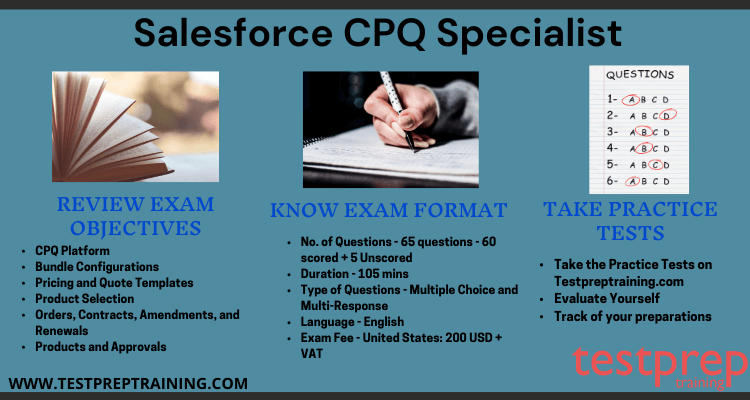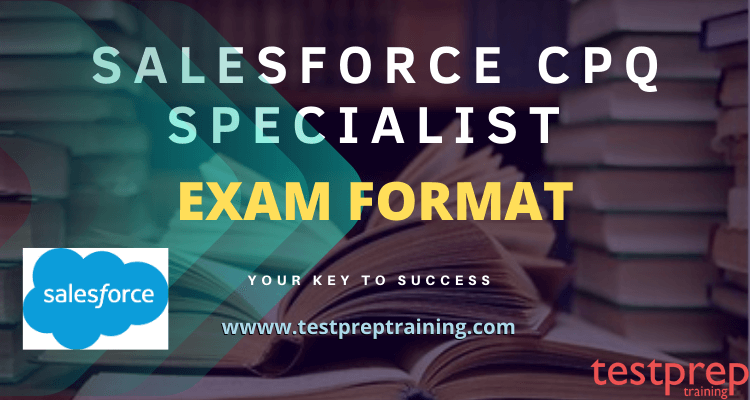The Salesforce CPQ Specialist certification is a valuable credential for professionals who work with Salesforce CPQ in the Salesforce ecosystem. This certification validates their expertise in using Salesforce CPQ to configure, price, and quote products and services, and showcases their proficiency in leveraging Salesforce CPQ to drive sales success.
The value of Salesforce CPQ Specialist certification for professionals in the Salesforce ecosystem can be summarized as follows:
- Enhanced Career Opportunities: Having the Salesforce CPQ Specialist certification can open up new career opportunities in the Salesforce ecosystem, as it demonstrates a high level of expertise and specialization in Salesforce CPQ. Certified professionals can pursue roles such as Salesforce CPQ Administrator, Salesforce CPQ Consultant, or Salesforce CPQ Developer, and stand out in a competitive job market.
- Increased Credibility and Trust: Salesforce CPQ Specialist certification is recognized and endorsed by Salesforce, a leading CRM platform. Holding this certification adds credibility and trust to a professional’s profile, showcasing their knowledge and skills in Salesforce CPQ to potential employers, clients, and peers.
- Improved Salesforce CPQ Skills: The certification process involves in-depth preparation and understanding of Salesforce CPQ concepts, functionalities, and best practices. Certified professionals gain a comprehensive understanding of Salesforce CPQ and develop skills to configure, price, and quote products and services more effectively, resulting in improved performance in their roles.
- Access to Exclusive Resources: Salesforce CPQ Specialists gain access to exclusive resources, such as Salesforce CPQ Specialist community, official Salesforce documentation, and updates, which provide ongoing support for their professional development and keep them up-to-date with the latest Salesforce CPQ trends and best practices.
- Higher Earning Potential: Certified Salesforce CPQ Specialists are in high demand in the job market, and their specialized skills and expertise often command higher salaries compared to non-certified professionals. Earning the Salesforce CPQ Specialist certification can potentially lead to higher earning potential and better career growth opportunities.
Salesforce CPQ Specialist Exam Format
The exam format will help you plan a strategy to prepare and attempt the test in the most effective way.
- Firstly, the maximum allowed time for the Salesforce CPQ Specialist Exam is 105 minutes.
- Secondly, the exam consists of 65 questions in total. Out of these, 60 are scored questions and 5 are unscored.
- Further, the Salesforce CPQ Specialist Exam Questions are in multiple-choice/multiple-select format. Thus, you will have a few options for each question and you can use the method of elimination to reach the correct option(s).
- Also, there are no negative marks for wrong answers. So, you can try out the guesswork wherever needed.
- Furthermore, you have to score a minimum of 65% marks to pass the exam and get certified.
- Lastly, the exam fee for Salesforce CPQ Specialist Exam is $200. You will have to pay the taxes as per your local laws.
Scheduling the Salesforce CPQ Specialist exam
To schedule the Salesforce CPQ Specialist exam, you will have to visit the official page of Kryterion Webassessor for Salesforce exams. On this page, you will have to create an account and after providing the necessary details and paying the exam fee, you can schedule the exam.
Salesforce CPQ Specialist Course Outline
The comprehension of the course outline for the Salesforce CPQ Specialist exam is the first step that you need to take to start your preparations. The exam is divided into 8 domains. The following outline will show you the weightage of each of the domains represented as the percentage of questions in the exam. With this understanding of the topics and weightage, you can strategize your study plan focus around these domains.
Topic 1: CPQ Platform: 23%
- Designing, configuring, and troubleshooting price rules using lookup objects and formula fields to meet business requirements. (Salesforce Documentation: Price Rule Considerations, Using Price Rule Lookup Queries Against Custom Objects)
- Applying an understanding of quote calculation sequence and quote line pricing fields to meet pricing and business requirements. (Salesforce Documentation: Price Rule Considerations, Pricing and Calculation Package Settings, CPQ Quote Calculation Sequence)
- Utilizing out-of-the-box and custom permissions, record types, fieldsets, and page layouts to ensure users can fulfill their job requirements. (Salesforce Documentation: Salesforce CPQ Profile Permissions)
- Demonstrating knowledge of CPQ data flow across CPQ objects. (Salesforce Documentation: Mapping Custom Fields Between Objects)
- Demonstrating knowledge about the CPQ object data model as it relates to data migration. (Salesforce Documentation: Implementing CPQ – Data Migration Considerations And Best Practices)
- Setting up CPQ for localization and multi-currency for international customers and users. (Salesforce Documentation: Guidelines for Using Salesforce CPQ in Multicurrency Orgs, Translating Salesforce CPQ Records, Multi-currency in Salesforce CPQ)
- Determining the necessary CPQ package-level settings. (Salesforce Documentation: CPQ Package Settings)
- Determine how the CPQ managed package fits within a Salesforce org. (Salesforce Documentation: Salesforce CPQ Installation)
Topic 2: Bundle Configurations: 17%
- Setting up a bundle structure to meet business requirements. (Salesforce Documentation: Product Bundles, Constraint Guidelines, Considerations for Product Options, Configuration Attribute Guidelines)
- Setting up product rules to meet business requirements. (Salesforce Documentation: Product Rule Guidelines, Product Rules)
Topic 3: Pricing: 16%
- Identifying the appropriate pricing strategy (discount schedules, block pricing, contracted prices, subscription pricing, per cent-of-total, usage-based pricing). (Salesforce Documentation: Product Pricing Methods, Term Discount Schedules for Subscription Products, Slab Discount Schedules with Block Prices, Contracted Pricing, Block Pricing)
- Determining expected pricing outcomes. (Salesforce Documentation: Product Pricing Overview, Apply Partner Discounts first in the price waterfall with Salesforce CPQ)
Topic 4: Quote Templates: 7%
- Setting up a quote template to meet business requirements. (Salesforce Documentation: Building Your CPQ Documents with CPQ Templates, Create, Preview, and Activate Quote Templates, Styling Your CPQ Quote Documents, Conditionally Show Template Sections
Topic 5: Product Selection: 7%
- Using search filters, fieldsets, and custom actions to enable product selection and configuration. (Salesforce Documentation: Create a Filtering Custom Action, Search Filters)
Topic 6: Orders, Contracts, Amendments, and Renewals: 15%
- Demonstrating the data required to generate orders and contracts. (Salesforce Documentation: Guidelines for Creating Orders, Creating a Contract from an Order, Creating a Contract from an Opportunity, Guidelines for Setting Up CPQ Orders)
- Demonstrating an understanding of how to generate renewal and amendment quotes to meet business requirements. (Salesforce Documentation: Amend Your Contracts and Assets, Amend Your Contracts, Renew Your Contracts and Assets, Amendment Processes)
- Recommending when to use orders, contracts, subscriptions, and assets to meet business requirements. (Salesforce Documentation: Manage Your Subscriptions and Assets, Subscription Guidelines)
Topic 7: Products: 11%
- Demonstrating how to set up products, price books, and price book entries. (Salesforce Documentation: Product, Price Book, Price Book Entry, and Product Schedule Fields, Manage Price Books, Guidelines for MDQ Products, Usage Pricing Guidelines)
- Demonstrating how product catalog setup impacts overall CPQ data flow. (Salesforce Documentation: How To: Salesforce CPQ: Create a Product Catalog)
Topic 8: Approvals: 4%
- Selecting and setting up advanced or native approvals to meet business requirements. (Salesforce Documentation: Setting Up Advanced Approvals)
Preparing for the Salesforce CPQ Specialist Exam

- Study the Exam Guide: The Salesforce CPQ Specialist exam guide is a valuable resource that outlines the exam objectives, content areas, and recommended study materials. Review the exam guide thoroughly to understand what topics will be covered in the exam and focus your preparation accordingly.
- Review Salesforce Documentation: Salesforce provides extensive documentation on Salesforce CPQ, including implementation guides, user guides, and release notes. Review these resources to gain a deep understanding of the functionalities, configurations, and best practices related to Salesforce CPQ.
- Take Practice Exams: Practice exams are an excellent way to familiarize yourself with the exam format and types of questions you may encounter. Salesforce provides official practice exams for the Salesforce CPQ Specialist certification. Take these practice exams to assess your knowledge, identify areas of improvement, and get a feel for the actual exam.
- Hands-on Experience: Hands-on experience with Salesforce CPQ is crucial for exam preparation. Spend time working with Salesforce CPQ in a sandbox environment or a free trial org to gain practical experience with configuring products, setting up pricing rules, and generating quotes.
- Explore Trailhead: Salesforce Trailhead is a free online learning platform that offers interactive modules and trails on various Salesforce topics, including Salesforce CPQ. Complete relevant trails and modules to reinforce your knowledge and skills in Salesforce CPQ.
- Join Study Groups: Joining study groups or engaging in discussion forums with fellow Salesforce CPQ professionals can help learn from others’ experiences, discuss challenging topics, and gaining insights from different perspectives.
- Time Management: Manage your time effectively during the exam. Read each question carefully, and avoid spending too much time on any single question. If you’re unsure about an answer, mark it for review and move on to the next question. Make sure to review your marked questions before submitting the exam.
- Stay Updated with Latest Updates: Salesforce regularly updates its products, including Salesforce CPQ. Stay updated with the latest product releases, features, and enhancements by reading release notes and staying engaged in the Salesforce community.
Furthermore, to assist you in your journey to success, we are providing you our Online Tutorials. These tutorials are designed to breakdown the process of preparation into smaller segments that are easy to comprehend by the candidates. This will strengthen your efforts and help you stay on the right track throughout the journey.
Expert Corner
To sum up, Salesforce CPQ Specialist certification will help you earn new job opportunities and allow you to build a great career. The exam is tough, but with the correct strategy and efforts, you can see yourself through with flying colors. Before you commence your preparatory phase, it essential to collect all the information about the exam and certification.
Clearing out all the doubts and queries beforehand will always be beneficial for you in building a strong foundation of skill and knowledge. Practice tests will be your last stage of the preparations. It is vital to attempt multiple Salesforce CPQ Specialist Practice Exams, as it will help you get acquainted with the exam. Also, these tests will keep your preparations on track and give you honest feedback on your abilities and skills. So when you’re ready to examine yourself, try free practice tests here!



